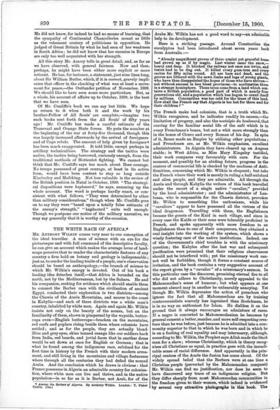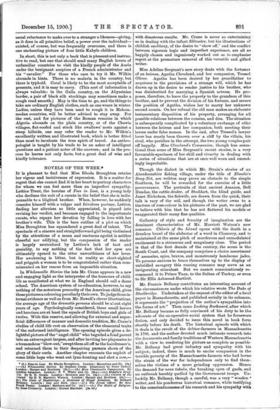THE WHITE RACE OF AFRICA.*
Ma. ANTHONY Wrialns comes very near to our conception of the ideal traveller. A man of science with an eye for the picturesque and with full command of the descriptive faculty, he can give an account which makes the average lover of land- scape perceive that to render the characteristic features of any country a firm hold on botany and geology is indispensable ; just as, to render the leading traits of a people, one's observation should be based on anthropology,—the branch of science to which Mr. Wilkin's energy is devoted. Out of his book a leading idea detaches itself,—that Africa is bounded on the north, not by the Mediterranean, but by the Sahara. He and his companion, seeking for evidence which should enable them to connect the Berber race with the civilisation of ancient Egypt, conducted their exploration in two districts—among the Chawia of the Aures Mountains, and nearer to the coast in Kabylia—and each of these districts was a white man's country, inhabited by white men. Again and again Mr. Wilkin insists not only on the beauty of the scenes, but on the familiarity of them, shown in pimpernel by the wayside, butter- cups even—English buttercups—bracken on the mountains, red roofs and poplars rising beside them where colonists have settled ; and as for the people, they are actually blond. Blue and grey eyes, skins tanned orange like our soldiers back from India, red beards, and jovial faces that in another dress would be set down at once for English or German ; that is what he found among the indigenous race, subdued for the first time in history by the French with their modern arma- ment, and still living in the mountains and village fastnesses where through all the centuries they had defied the nomad Arabs. And the conclusion which he draws is obvious : that France possesses in Algeria an admirable country for colonisa- tion, where white men can live and thrive, and in the native population—in so far as it is Berber, not Arab, for of the • Among the Berbers of Algeria. By Anthony WHAM. London : T. Fisher tinwIn. Reel
Arabs Mr. Wilkin has not a good word to say—an admirable help to its development.
Here is a striking passage. Around Constantine the eucalyptus had been introduced about seven years back from Australia :— a Already magnificent groves of these quaint yet graceful trees had grown up as if by magic. Last winter came the snow,—
heavy. and deep. It blocked the railway not once nor twice, and trains had to be dug out. It killed every gum-tree and every cactus for fifty miles round. All are bare and dead, and the groves are littered with the sawn limbs and logs of young giants, who have thus disappointed the hopes of those who have striven-- not without success in less bleak provinces—to acclimatise them in a strange hemisphere. These trees come from a land which con. tains a British population, a good part of which is nearly four generations old, and a population which has begun to count itself by millions. Constantine was too cold for the trees of this land. How shall the French say that Algeria is too hot for them and for their children ? "
The French make bad colonists, that is a truth which Mr. Wilkin recognises, and he indicates readily its causes,—the limitation of progeny, and also the nostalgie du boulevard, that craving for the familiar social life of the cafe which is in every Frenchman's bones, but not a whit more strongly than in the bones of Cicero and every Roman of his day. In spite of it, Rome made an Empire by utilising other populations ; and Frenchmen are, as Mr. Wilkin emphasises, excellent administrators. In Algeria they have cleared up an Augean stable ; in West Africa, as Miss Mary Kingsley testified, their work compares very favourably with ours. For the moment, and possibly for an abiding future, progress in the centres of commercial life is checked by the madness of Anti- Semitism, concerning which Mr. Wilkin is eloquent ; but take the French where their work is merely in ruling a half-subdued
and alien people, and they are admirable. All through the Aures and through Kabylia the writers of this book travelled under the escort of a single native " cavalier," provided by the local administrator ; and the administrator of Lan-
bessa, who is responsible for the Chawia district, provokes Mr. Wilkin to something like enthusiasm, while his " cavaliers " appear to have possessed all the virtues of the ideal dragoman. Travelling with them, the Englishmen became the guests of the Kaid in each village, and since in every case the Kaids or their sons were tolerably proficient in French, and spoke apparently with more freedom to an Englishman than to one of their conquerors, they obtained a real insight into the working of the system, which shows a wisely fostering care of the native institutions. Indeed, one of the Government's chief troubles is with the missionary question; the Kabyles after the last war and subsequent pacification were promised that their religious observances should not be interfered with; yet the missionary work can- not well be forbidden, though it forms a constant source of irritation, and the book contains a very suggestive account of the report given by a " cavalier " of a missionary's sermon. In this particular case the discourse, promising eternal fire to all who did not adhere to Christianity, merely appealed to the Mahommedan's sense of humour ; but what appears at one moment absurd may in another be unbearably annoying. Yet though Mr. Wilkin deprecates the action of preachers who ignore the fact that all Mahommedans are by training controversialists scarcely less ingrained than Scotchmen, he is in no way an enthusiast for Islam. He dislikes it on the ground that it always encourages an admixture of races. If a negro is converted to Mahommedanism he becomes by general consent a better, manlier, and more self-respecting crea- ture than he was before, just because he is admitted into a com-
munity superior to that in which he was born and in which he is on a footing of real equality and may intermarry, although, according to Mr. Wilkin, the Prophet says Allah made the black man for a slave ; whereas Christianity, which in theory recog- nises all Christians as equal, in practice goes with the ineradi- cable sense of racial difference. And apparently in the prin- cipal centres of the Aures the fusion has come about. Of the widely spread belief that the Berbers were at one time a Christian people (perverted by the Mahommedan conquest) Mr. Wilkin can find no justification, nor does he seem to have discovered any trace of an indigenous religion. But they differ sharply from most Mahommedan communities in the freedom given to their women, which indeed is evidenced by several very attractive photographs in this book. The usual reluctance to make over to a stranger a likeness—giving, as it does in all primitive belief, a power over the individual— existed, of course, but was frequently overcome, and there is one enchanting picture of four little Kabyle children.
In short, this is not only a book that is pleasant and instruc- tive to read, but one that should send many English lovers of unfamiliar countries to visit the kindly people of the Aures under the benignant auspices of a French administrator and his "cavalier." For those who care to try it Mr. Wilkin abounds in hints. There is no malaria in the country, but there is typhoid. Coral is likely to be the most acceptable of presents, and it is easy to carry. (This sort of information is always valuable: in the Galla country, on the Abyssinian border, a pair of black silk stockings may sometimes make a rough road smooth.) May is the time to go, and the things to take are ordinary English clothes, such as one wears in winter. Ladies, unless they have been used to rough it in Mahom- medan countries, will be better advised to stay away. For the rest, and for pictures of the Roman remains in which Algeria abounds on the plain country, or of the Chawia villages, flat-roofed and stuck like swallows' nests against a steep hillside, one may refer the reader to Mr. Wilkin'e excellently written and illustrated book, which is better fitted than most to inculcate the true spirit of travel. An anthro- pologist is taught by his trade to be an asker of intelligent questions and a patient noter of the answers ; and in the pro- cess he learns not only facts, but a great deal of wise and kindly tolerance.















































 Previous page
Previous page